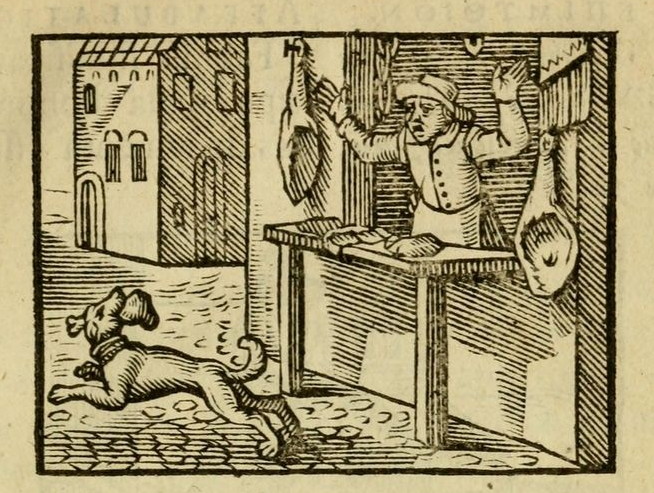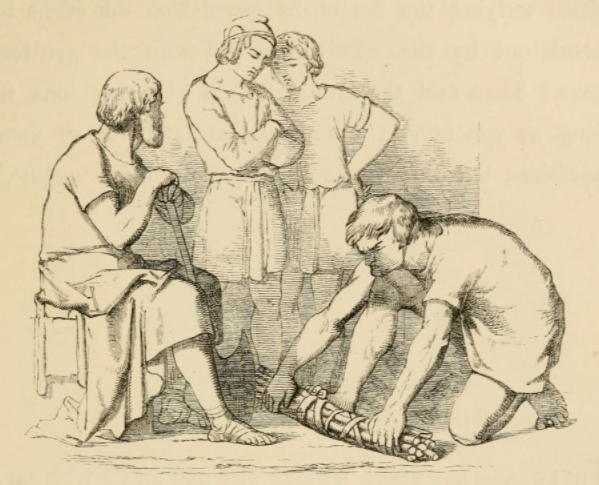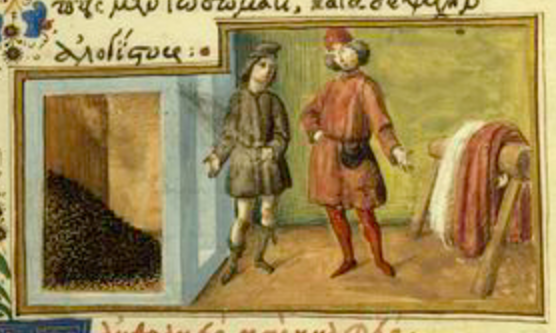36. Of the Dog and the Butcher
When a dog had taken away flesh from the butcher in the shambles, immediately he betook himself to his heels as much as he could. The butcher, struck with the loss of the thing, at first held his peace, afterwards, taking courage, thus he cried to him afar off, "O most thieving cur, run safe; it is lawful for thee to run unpunished, for now thou art safe for thy swiftness, but hereafter thou shalt be observed more cautiously."
Moral. This fable signifies that most men then at length become more cautious when they have received damage.

37. Of the Lamb and the Wolf
The wolf meets the lamb accompanying the goat; he asks why, his mother being left, he rather follows a stinking goat, and advises that he would return to the dugs of his mother, stretched with milk, hoping that it would be so that he may butcher him drawn away; but he says, "O wolf, my mother hath committed me to him. To him the chief care of keeping is given; I shall obey a parent rather than thee, who requirest to seduce me with those sayings, and by and by to tear me in pieces drawn away.
Moral. Be unwilling to have faith in all men, for many, whilst they seem to be willing to profit others, in the meantime consult for themselves.
38. Of the Husbandman and his Sons
A husbandman had many sons, and they were disagreeing among themselves; whom the father labouring to draw to mutual love, a little faggot being put, commands each of them to break it bound about with a short cord; their weak youth endeavoureth in vain. The father looses it and gives to each a twig, which, when with his strength every one easily broke, he saith, "O children, thus nobody will be able to conquer you agreeing, but if ye shall be willing to rage with mutual wounds and to drive on intestine war, ye shall be at length for a prey to your enemies."
Moral. This fable teaches that small things increase by concord; great things fall away by discord.

39. Of the Collier and the Fuller.
The collier invited the fuller that he would dwell with him in the same house. The fuller saith, "My man, that is not to me either to my heart or profitable, for I fear greatly lest what things I wash clean, thou mayest make as black as a coal is."
Moral. We are admonished by this apologue to walk with the unblamed; we are admonished to avoid the company of wicked men as a certain plague, for every one cometh out such as they are with whom he is conversant.

40. Of the Fowler and the Ring-Dove
The fowler sees the ringdove afar off, making a nest in a very high tree; he hastens to him; finally he contrives snares; by chance, he presses a snake with his heels; he bites him. He, terrified at the sudden evil, says, "Wretched me! Whilst I lay snares for another, I myself perish."
Moral. This fable signifies that they sometimes are circumvented with their own arts, who meditate evil things.

No comments:
Post a Comment
Comments are limited to Google accounts. You can also email me at laurakgibbs@gmail.com or find me at Twitter, @OnlineCrsLady.